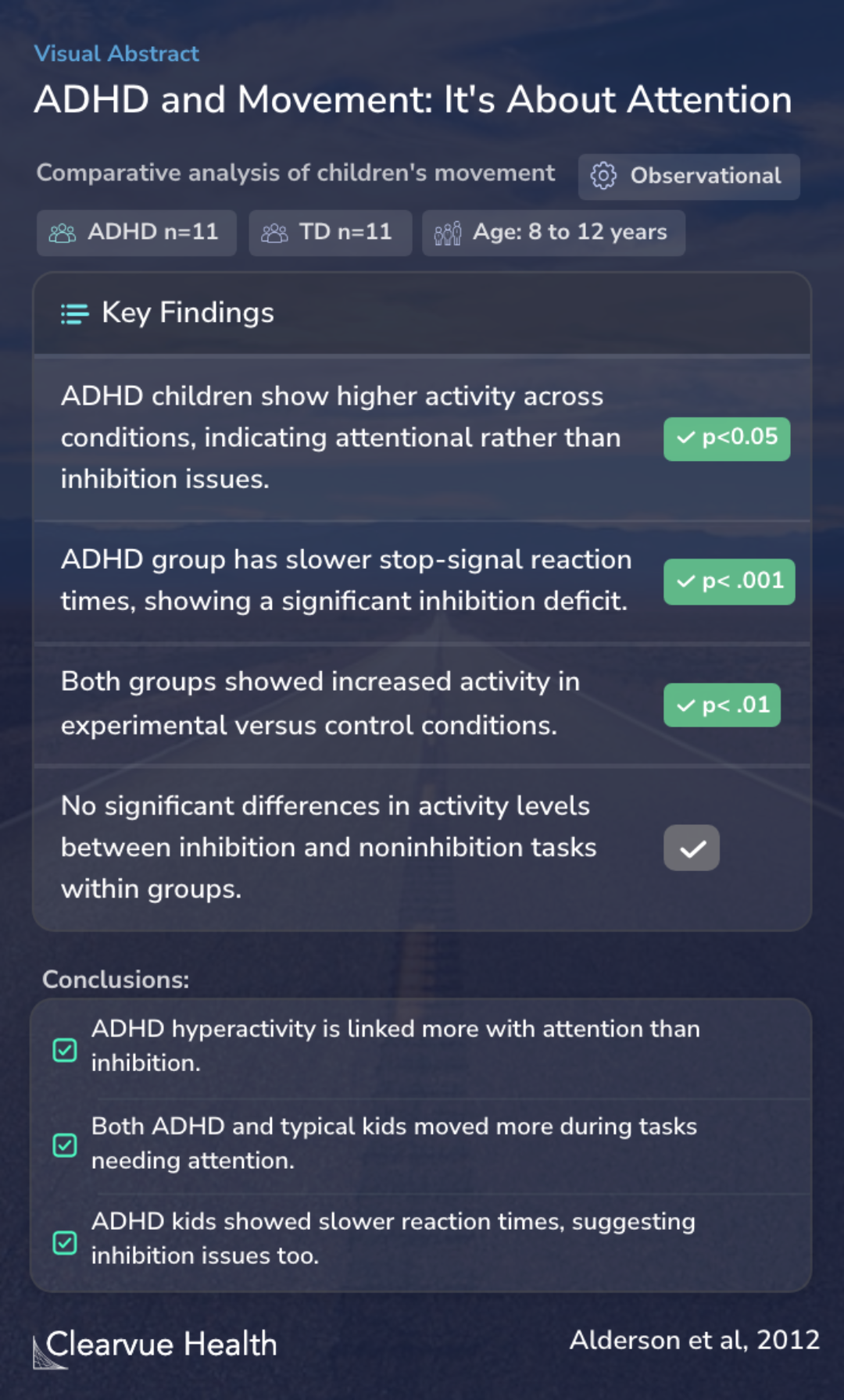Hyperactivity in boys with attention deficit/hyperactivity disorder (ADHD): the association between deficient behavioral inhibition, attentional processes, and objectively measured activity
ADHD and Movement: It's About Attention
Alderson RM, Rapport MD, Kasper LJ, Sarver DE, Kofler MJ

Objectives
The study delves into the idea that when kids are hyper, it might not just be because they can't hold back their actions but also because they're having a hard time paying attention. The authors set out to see how moving around and not being able to stop oneself from doing something are connected by putting kids in different situations where they had to either pay attention or hold back on doing something.
Contemporary models of ADHD hypothesize that hyperactivity reflects a byproduct of inhibition deficits. The current study investigated the relationship between children's motor activity and behavioral inhibition by experimentally manipulating demands placed on the limited-resource inhibi...
Methods
In their investigation, the authors looked at 22 boys, some with ADHD and some without, to see how they moved in different situations. They asked these kids to do tasks that checked their ability to stop themselves from doing something, like when you hear a beep and you have to stop what you're doing right away. They wore special watches that tracked how much they moved, to see if the kids with ADHD would move more than the kids without ADHD, especially in situations that required more attention or control.
Twenty-two boys (ADHD = 11, TD = 11) between the ages of 8 and 12 years completed a conventional stop-signal task, two choice-task variants (no-tone, ignore-tone), and control tasks while their motor activity was measured objectively by actigraphs placed on their nondominant wrist and an...
Results
The study found something quite interesting: all the kids, no matter if they had ADHD or not, moved more during the tasks compared to when they were doing simpler things that didn't need much attention or control. However, the kids with ADHD moved a lot more in all the situations. But here's the kicker: the amount they moved didn't really change whether the task was about paying attention or holding back on doing something. This suggests that maybe the reason they're moving so much isn't just because they can't control themselves but also because they're having a hard time focusing.
No differences in activity level were observed between the inhibition and noninhibition experimental tasks for either group, indicating that activity level was primarily associated with basic attentional rather than behavioral inhibition processes.
Conclusions
The findings suggest that for kids with ADHD, being hyper might have more to do with issues in paying attention than problems with stopping themselves from acting. This is an important insight because it helps us understand that when we see a kid who can't sit still, it might not just be about not being able to control their actions. Both the kids with ADHD and the ones without moved more when they were trying to pay attention to something, showing that moving around might be a way for them to try and focus. However, the kids with ADHD were also slower in tasks that required them to stop quickly, hinting that they might have trouble with control, too.
Children with ADHD exhibit higher activity levels than typically developing children across both experimental and control conditions, indicating that hyperactivity in ADHD may be more closely related to basic attentional processes rather than deficiencies in behavioral inhibition.
Key Takeaways
Context
This study adds to what we already know about hyperactivity and attention problems in kids. For example, one study looked at fidget spinners, those little toys that spin around, and found that they might make kids less hyper but also less focused.
Another research study found that kids who are very active and impulsive might end up having more trouble paying attention as they get older. These findings together show that there's a lot more to hyperactivity and attention problems than meets the eye, and understanding these connections can help us find better ways to support kids with ADHD.